
Fortune favours the brave, and the loyal. And Vinubhai Kanjibhai Jaipal, who served Gajrajsinh Jadeja unflinchingly through thick and thin, will attest to it, having inherited Rs 600 crore from his late employer, says Haresh Pandya.
Fortune can smile upon you when least expected. Vinubhai Kanjibhai Jaipal, who hails from Virva, a hamlet in the Rajkot district in Gujarat, will vouch for it.
Jaipal, a servant of Congress bigwig and co-operative leader Gajrajsinh Jadeja alias Bapu for nearly 40 years, was rewarded for his loyalty when his master, a bachelor, who died in September last year, bequeathed him property worth Rs 600 crore.
“The reality is yet to sink in. I still can’t believe that Bapu has left all his property and savings to me,” said a visibly-delighted but down-to-earth Jaipal. “I knew he loved me and treated me like a son. But never ever did I imagine that he would consider me his sole heir.”
Jadeja’s assets include acres of land worth crores in Rajkot, Virva and other places, about half-a-dozen houses, gold, cash, fixed deposits, stocks and securities and other savings.
Fearing that his relatives might harass Jaipal after his death since he had bequeathed everything to his servant, Jadeja got his will prepared by legal luminaries. And his fears were not unfounded. Last week Jaipal was allegedly kidnapped and held prisoner by Jadeja’s nephews and other relatives. But the police intervened before any serious harm could be done to Jaipal, rescued him and arrested his kidnappers.
“I’ve no reason to worry simply because Bapu (as he calls Jadeja) has got his will prepared by the professionals, ensuring that nobody challenges it and me,” Jaipal emphasised.
Jadeja, who belonged to the warrior Kshatriya community, which ruled many princely states in Gujarat before India’s independence, was an illiterate but visionary farmer. He started out in life with little means and limited resources but always dreamt big and aimed high. Using his intelligence and modern agricultural techniques, he began to reap a rich harvest, literally and figuratively. What followed was heavy, rewarding investments in real estate. He had huge assets, income and little expenses.
 A man of independent thought who loved his freedom more than anything else, Jadeja did not want to be bound by the shackles of family attachment. He had a good sense of humour, but his volcanic temperament (Jaipal often had to bear its brunt) sometimes overshadowed it and people tended to shun his company, though he did have his coterie of friends and followers. Keeping all these factors in mind, he vowed never to marry.
A man of independent thought who loved his freedom more than anything else, Jadeja did not want to be bound by the shackles of family attachment. He had a good sense of humour, but his volcanic temperament (Jaipal often had to bear its brunt) sometimes overshadowed it and people tended to shun his company, though he did have his coterie of friends and followers. Keeping all these factors in mind, he vowed never to marry.
In the 1970s, Jadeja and his coterie used to hold a mehfil at Dholra House in Mill Para in Rajkot every evening, which usually lasted till late night. Jaipal, who was in his mid-teens around the time and whose real name was Kanak, was living with his family at Dholra House. An ‘office boy of sorts’ at this mehfil, Jaipal would bring tea, coffee and eatables that Jadeja and his friends ordered. Everybody had a great liking for the young Jaipal, particularly Jadeja. He and all others began to affectionately call him ‘Vinubhai’, a nickname that stuck.
In 1976, Jaipal was diagnosed with tuberculosis. Jadeja asked him to go for necessary medical treatment, but Jaipal did not have the money. Jadeja ordered him to pack up his stuff and took him to his farm in Virva. They stayed in a tiny room on the farm. Jadeja took special care and arranged for his medical treatment. Slowly but surely, Jaipal recovered after nearly three months, “much to the delight of Bapu”.
An “eternally grateful” Jaipal became Jadeja’s true sevak after his illness and began to serve him with “single-minded dedication”. As Jadeja rose economically and politically, Jaipal began taking care of his “tiniest needs”. He knew what his master liked and what he did not. Jaipal established himself as a good cook in due course of time and Jadeja became fond of his cooking, often asking him to make dishes and delicacies of his choice. Jadeja’s house was always full of guests and visitors and Jaipal willingly served them, too.
Often Jadeja would ask Jaipal to marry, but he would not listen. All that he wanted to do in life was to serve his master, said Jaipal. But Jadeja had the last word and Jaipal got married in 1991. Jadeja was nearly 63 at the time. Jaipal had a son and a daughter in the first two years of marriage. “Bapu was very happy becoming the grandfather of my children,” recalled Jaipal. “Since both Bapu and I were uneducated, he was very keen that my children got the best of education.”
Jadeja arranged for the education of Jaipal’s children first in one of Rajkot’s best and most expensive schools and then in a public school in Bangalore. As they grew, the children were sent to England for higher education. “They are still in England pursuing their studies,” said Jaipal.
Meanwhile, an aging, fragile Jadeja was having health problems. He suffered an attack of paralysis in 1993. In 2004, he had a serious eye problem and had to undergo operations in Rajkot, Ahmedabad and Mumbai. Jaipal stood by him during all these years and served him, looking after everything and “never making him feel like a patient”.
About two years ago Jadeja had a fall in his house and had to undergo major surgery. He was completely bed-ridden, but Jaipal was invariably around him. It was during this period that Jadeja realised his end was fast approaching and he decided to make a will. The rest, as they say, is history.
Images: (top) Vinubhai Kanjibhai Jaipal and below Gajrajsinh Jadeja








 © 2025
© 2025